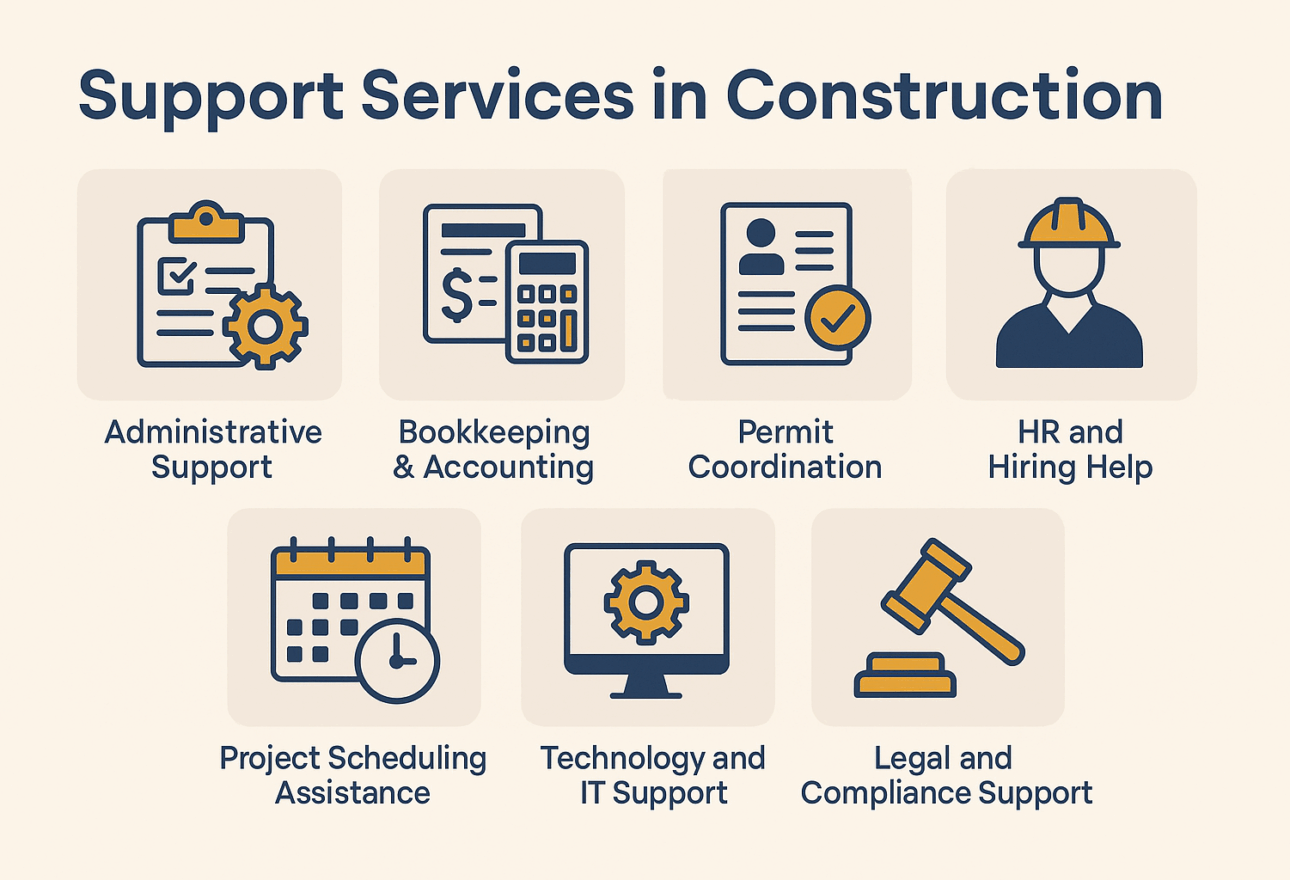Construction projects aren’t just about building walls and pouring concrete. Behind the scenes, a team of support services keeps everything running smoothly. These services help the project stay on schedule, stay within budget, and meet legal and safety requirements.
In this article, we’ll break down what construction support services are, why they matter, and who provides them—all in plain language anyone can understand.
What Are Support Services?
Support services in construction are non-building tasks that help a construction project succeed. They don’t involve hammering nails or installing plumbing, but they’re just as important.
Think of support services as the “glue” that holds the whole project together. These services include:
- Administrative Support
- Bookkeeping & Accounting
- Permit Coordination
- HR and Hiring Help
- Project Scheduling Assistance
- Technology and IT Support
- Legal and Compliance Support
Without these services, even the most skilled builders would struggle to stay organized and meet deadlines.
Types of Construction Support Services (Explained Simply)
1. Administrative Support
Admins keep track of paperwork, schedules, and communication. They handle emails, organize files, and help project managers stay on top of tasks.
Example Tasks:
- Answering calls and emails
- Sending out project updates
- Organizing job site files
- Scheduling meetings
2. Bookkeeping & Accounting
Every project has a budget. Bookkeepers make sure money is tracked correctly, bills are paid on time, and reports are available when needed.
Example Tasks:
- Managing payroll
- Sending invoices
- Tracking expenses
- Creating profit/loss statements
3. Permit Coordination
Before starting work, most jobs need permits from the local city or town. A permit coordinator makes sure all paperwork is filed correctly and on time.
Example Tasks:
- Filling out permit applications
- Submitting documents to town halls
- Following up on approvals
- Making sure projects follow code
4. Human Resources (HR) Help
Construction companies hire many workers and subcontractors. HR support helps make the hiring process smooth, legal, and safe.
Example Tasks:
- Posting job openings
- Helping with background checks
- Collecting employee documents
- Keeping track of safety training
5. Scheduling Support
Many people and machines are needed on a job site at different times. Scheduling experts help organize timelines so tasks don’t overlap or delay the job.
Example Tasks:
- Creating task calendars
- Sending reminders
- Coordinating with subcontractors
- Updating plans if things change
6. Technology and IT Support
Modern construction relies on technology, from smartphones to cloud-based software. IT support keeps systems running and helps with tools like estimating apps and project management platforms.
Example Tasks:
- Setting up software
- Helping teams learn new tools
- Fixing system bugs
- Managing digital files
7. Legal and Compliance Support
Construction has a lot of rules. Legal support helps make sure contracts are strong and companies follow the law.
Example Tasks:
- Reviewing contracts
- Managing insurance paperwork
- Handling compliance checks
- Helping with disputes
Why Are Support Services Important?
Support services might not build the structure, but they keep the project from falling apart.
Here’s what they help with:
- Saving Time: Admins and schedulers take small tasks off the contractor’s plate so they can focus on the build.
- Avoiding Mistakes: Bookkeepers and permit coordinators prevent legal and financial slip-ups.
- Improving Communication: Updates go out on time, keeping everyone in the loop.
- Keeping Projects on Budget: Every dollar is tracked and accounted for.
- Meeting Deadlines: With good scheduling and coordination, projects finish on time.
Who Uses Construction Support Services?
Support services are used by:
- General Contractors
- Subcontractors
- Home Builders
- Commercial Construction Firms
- Developers
They can be in-house employees or remote service providers (like RemotPRO). Remote teams are often more cost-effective and flexible.
Why Remote Support Services Are Growing
In today’s digital world, many support tasks can be done online. You don’t need a full-time office staff when you can have remote professionals handling:
- Your bookkeeping
- Your permit submissions
- Your admin communication
With platforms like Zoom, Slack, and cloud-based software, remote support fits into construction like never before.
✅ Final Thoughts: Building Success from Behind the Scenes
Support services may not swing hammers, but they’re the backbone of every successful construction job. They provide the structure that holds your timeline, budget, and team together.
Whether you’re a solo contractor or running a 50-person crew, using the right support services can mean the difference between chaos and a completed project.





